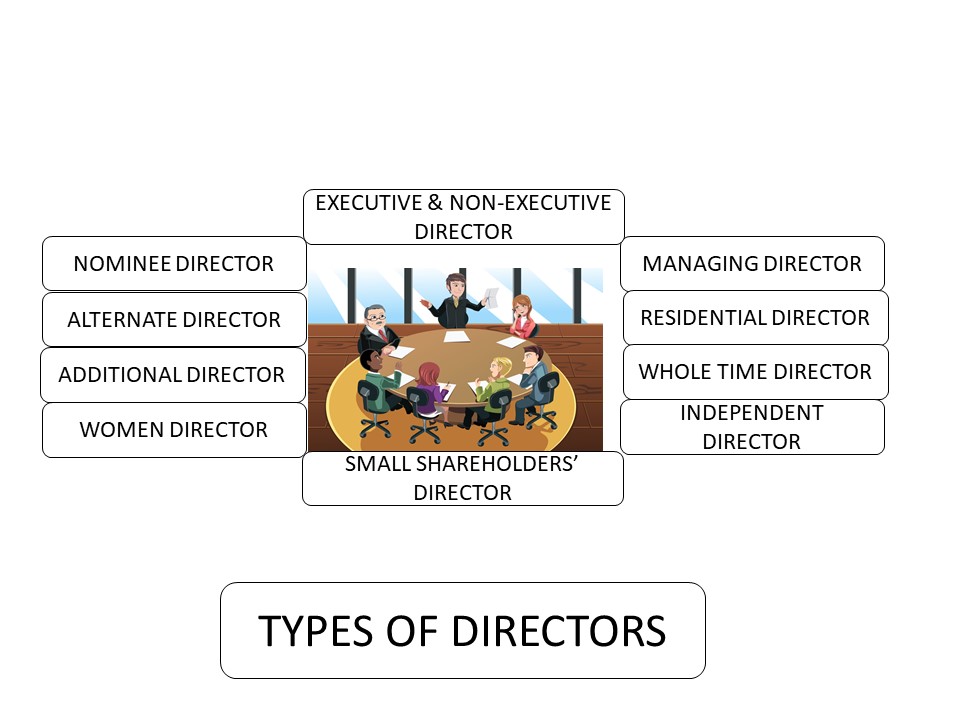Introduction
Every company whether private limited company or a public limited company has to appoint Board of directors.
As per Section 2(34) of the Companies Act 2013, the term Director means a director appointed by the Board of a company. Only Individuals can be appointed as directors as per Section 149(1) of the Companies Act 2013.
Every company shall have minimum number of directors as follows:
- In case of a Public company – minimum of 3 Directors.
- In case of a Private company – minimum of 2 Directors.
- In case of a One Person company – minimum of 1 Director.
The maximum number of directors shall be 15 directors.
Types of Director
A company may appoint the following types of directors:

Disqualification of Directors [Section 164]
Section 164 of the Companies Act 2013 deals with disqualification provisions. A person shall not be eligible to be appointed as a director if he suffers from any of the disqualifications.
The various disqualifications as stated under section 164 are:
As per sub-section (1) of section 164, a person shall not be appointed as a director if :
(a)he is of unsound mind and stands so declared by a competent court;
(b)he is an undischarged insolvent;
(c) he has applied to be adjudicated as an insolvent and his application is pending;
(d) he has been convicted by a court of any offence, whether involving moral turpitude or otherwise, and sentenced in respect thereof to imprisonment for not less than six months and a period of five years has not elapsed from the date of expiry of the sentence:
Provided that if a person has been convicted of any offence and sentenced in respect thereof to imprisonment for a period of seven years or more, he shall not be eligible to be appointed as a director in any company;
(e) an order disqualifying him for appointment as a director has been passed by a court or Tribunal and the order is in force;
(f) he has not paid any calls in respect of any shares of the company held by him, whether alone or jointly with others, and six months have elapsed from the last day fixed for the payment of the call;
(g) he has been convicted of the offence dealing with related party transactions under section 188 at any time during the last preceding five years; or
(h) he has not complied with the provisions of Director Identification Number (DIN) (i.e Section 152(3))
(i) he has not complied with the provisions of holding maximum number of directorships (i.e section 165(1)).
As per sub-section (2) of section 164, a person will be disqualified if he is or has been a director of a company which has committed a default as under:
(a) has not filed financial statements or annual returns for any continuous period of three financial years ; or
(b) the company has failed to repay the deposits accepted by it or repay the interest thereon or to redeem any debentures on the due date of pay interest due thereon or any dividend declared thereon and failure to pay or redeem continues for one year or more;
shall not be eligible to be re-appointed as a director of that company or appointed in other company for a period of five years from the date on which the said default has been committed.
However, if a person is appointed as a director of a company which has committed default as stated above (i.e as per (a) and (b)), he shall not incur the disqualification for a period of 6 months from the date of appointment.
Also, a private company which is not a subsidiary of a public company may provide for additional disqualifications in its Articles of Association for appointment of directors other than those stated above (i.e sub – section (1) & (2)) [Section 164(3)].
Disqualification as prescribed by Section 217(6)(ii)
Section 217(6)(ii) is reproduced hereunder:
(ii) If a director or an officer of the company has been convicted of an offence under this section, the director or the officer shall, on and from the date on which he is so convicted, be deemed to have vacated his office as such and on such vacation of office, shall be disqualified from holding an office in any company.
Section 217 of the Companies Act 2013 relates to a company which is under investigation. In case any director is disqualified as per section 217, he shall vacate his office from the date on which he is so convicted. On such conviction he shall be disqualified from holding any office/company.
Conclusion:
Every person appointed as a director should ensure compliance with the provisions of the Companies Act 2013. Adhering to the legal provisions not only upholds the integrity of the office but also helps to avoid disqualification of the directors.
🔗 Also read:
How to Become an Independent Director in India – Step by Step Guide


